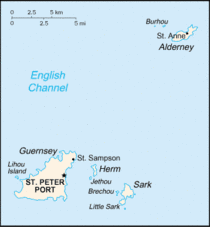Welcome to the Virtual Education Wiki ~ Open Education Wiki
Guernsey
by Paul Bacsich
For entities in Guernsey see Category:Guernsey
Partners situated in Guernsey
None.
Guernsey in a nutshell
The Bailiwick of Guernsey is a British Crown Dependency set in the English Channel near to the Normandy coast in France. The United Kingdom is responsible for the Bailiwick's defence and ultimately for good governance, and for representing the Bailiwick in international fora, while the Bailiwick's own parliament and government have competence over all domestic matters.
Geographically, Guernsey consists of the main island, Guernsey, as well as the smaller islands of Alderney and Sark and some islets. Alderney and Sark are in fact autonomous regions of the Bailiwick of Guernsey (despite their small populations - around 2400 for Alderney and around 600 permanent residents for Sark) but we hope readers will forgive us for not separately researching their approach to e-learning.
Guernsey has a population of just over 65,000 according to the CIA Factbook. Thus it is comparable in size to many smaller towns in Europe, such as Stafford, Salisbury and Crewe in England.
However, as an autonomous region it has to deliver the full panoply of domestic government and policy - no small task, even if it can adopt or adapt a certain amount of UK policy.
Guernsey has indigenous broadcasting, from BBC Radio and Television and the ITV company Channel Television
Guernsey education system
It is similar to the UK model.
Schools in Guernsey
Guernsey adopts mainly England's National Curriculum, including the use of the GCSE and A Level system, in terms of content and structure of teaching. Children are allocated a primary school on a basis of catchment area, or are allowed to attend either of two Catholic primary schools. In terms of admissions however the island continues to use the 11 plus exam to decide whether a child should receive education at the Grammar School, or receive state funded places at the independent schools Elizabeth College for boys, and for girls The Ladies College, or Blanchelande College (Roman Catholic).
Parents have the choice to send children to independent schools as fee payers.
Children who are not selected for the Grammar School or colleges attend the secondary schools of La Mare de Carteret School, Les Beaucamps School, or St Sampson's High School.
Higher education
Universities in Guernsey
There are no universities in Guernsey so that most students wishing to take a degree course leave the Island whilst they continue their studies or undertake studies by distance learning for example at the UKOU. However, mention should be made of the Institute of Health and Social Care Studies, Guernsey Studies which appears to offer some HE courses e.g. in nursing from the University of Sheffield. Also the news page reports that:
- Institute academic staff have been developing two new degree courses in partnership with the University of East Anglia (UEA). The courses will become available from September 2008. A successful university validation event was held in March for the new DipHE and BA(Hons) Professional Practice course that has been designed to meet the needs of staff working in the Health and Social Services Department, Guernsey... Also in development is a new pre-registration nursing course. This UEA course successfully underwent an NMC endorsement event in May. Students (who must be Guernsey residents) will be able to exit the three year course with a DipHE or BSc(Hons) in either Adult Nursing or Mental Health Nursing.
The UKOU supports students in Guernsey and has several students there (but they pay higher fees than UK students) and is believed to have a study centre on the Island.
Polytechnics in Guernsey
Further education is provided within the Island at Guernsey College of Further Education. The College has full time NVQ, GNVQ and AVCE courses in an array of subjects including catering, leisure and tourism, art and design, business and information technology. The College also offers day release courses and a number of evening courses. However, it does not offer any higher education courses.
Education reform
Not applicable.
The Bologna Process
Guernsey is not part of the European Union thus is not bound by Bologna. Having said that, it is normal for Guernsey to copy the main aspects of UK policy in such areas. The UK believes that to the first order of approximation its institutions already conform to Bologna.
Administration and finance
It is ad hoc and the subject of some current debate.
Quality assurance
There is no institution to which HE quality assurance directly applies. In general terms the UK QAA would oversee the quality of all UK HE provision which is delivered on the Island.
Information society
Towards the information society
(To be added if anything arises.)
Information society strategy
ICT in education initiatives
There is little visible sign of major supply or consumption of e-learning capability on the Bailiwick in FE (there is no HE). However, at the schools level the Guernsey Grid for Learning is well worth mention. The Achievements page notes:
- The Education Department's ICT Strategy was launched in 1999. Today, all maintained schools are served by 100mb links, from a centrally managed service. Each teacher within the Bailiwick has been provided with a laptop and the ratio of pupils to computers is 1:5 in Primary and 1:3 in Secondary. Interactive Whiteboards have been deployed in 80% of classrooms across the Department's schools.
- The Education Department is continuing to develop the Virtual Learning Environment which will provide every child with the opportunity to have a secure personalised learning area accessible from anywhere on the internet. The Guernsey Integrated Learning Environment (GILE) is due to launch in 2009.
Lessons learned
References
None.
See also Jersey and Isle of Man.
> Countries
For OER policies and projects in Guernsey see Guernsey/OER
